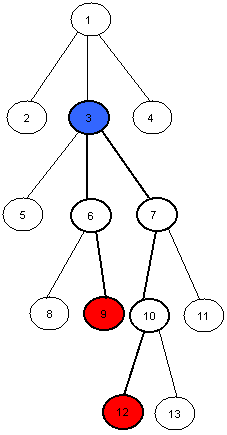LCA - Lowest Common Ancestor
A tree is an undirected graph in which any two vertices are connected by exactly one simple path. In other words, any connected graph without cycles is a tree. - Wikipedia
The lowest common ancestor (LCA) is a concept in graph theory and computer science. Let T be a rooted tree with N nodes. The lowest common ancestor is defined between two nodes v and w as the lowest node in T that has both v and w as descendants (where we allow a node to be a descendant of itself). - Wikipedia
Your task in this problem is to find the LCA of any two given nodes v and w in a given tree T.

For example the LCA of nodes 9 and 12 in this tree is the node number 3.
Input
The first line of input will be the number of test cases. Each test case will start with a number N the number of nodes in the tree, 1 ≤ N ≤ 1,000. Nodes are numbered from 1 to N. The next N lines each one will start with a number M the number of child nodes of the Nth node, 0 ≤ M ≤ 999 followed by M numbers the child nodes of the Nth node. The next line will be a number Q the number of queries you have to answer for the given tree T, 1 ≤ Q ≤ 1000. The next Q lines each one will have two number v and w in which you have to find the LCA of v and w in T, 1 ≤ v, w ≤ 1,000.
Input will guarantee that there is only one root and no cycles.
Output
For each test case print Q + 1 lines, The first line will have “Case C:” without quotes where C is the case number starting with 1. The next Q lines should be the LCA of the given v and w respectively.
Example
Input: 1 7 3 2 3 4 0 3 5 6 7 0 0 0 0 2 5 7 2 7 Output: Case 1: 3 1
hide comments
|
|
mr_kaka:
2025-03-23 11:27:30
spoj is abs bullshit |
|
|
coco11:
2024-12-31 09:01:44
is the root always 1? |
|
|
akhmadzhanov_9:
2024-11-22 16:15:25
<snip>
|
|
|
jpfr12:
2024-10-31 22:23:54
Spoj's online judge accepts the naive solution that runs in O(n) time for each query. However, this is a good exercise for practicing fast methods, such as Binary Lifting, Tarjan's offline LCA algorithm, and Euler Tour + RMQ. |
|
|
dvelagap:
2024-04-06 05:29:20
Used HLD , getting TLE. logic to find LCA is jumping chains using parent[head] of the chain, until both heads are same. |
|
|
luuphucvinh:
2023-09-13 06:28:48
use sqrt
|
|
|
baodepzai:
2023-09-13 05:18:07
easy
|
|
|
vuduoc:
2023-09-13 04:28:07
wow u re so good
|
|
|
anujjadhav0215:
2023-04-18 16:12:29
It is giving wrong ans, for my accepted code on hackerrank |
|
|
sky_0509:
2023-04-08 09:38:10
my code ac in cses and hear give wr and |
| Added by: | hossamyosef |
| Date: | 2013-05-13 |
| Time limit: | 0.600s-1.113s |
| Source limit: | 50000B |
| Memory limit: | 1536MB |
| Cluster: | Cube (Intel G860) |
| Languages: | All |
| Resource: | FCIS/ASU Local Contest 2013 |

 RSS
RSS